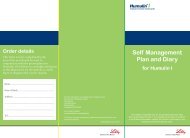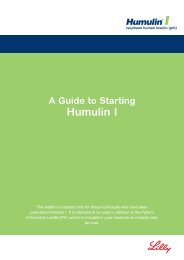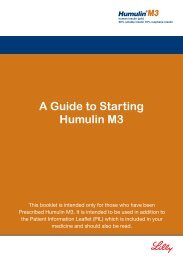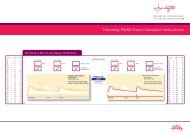Travelling - LillyPro
Travelling - LillyPro
Travelling - LillyPro
- No tags were found...
Create successful ePaper yourself
Turn your PDF publications into a flip-book with our unique Google optimized e-Paper software.
<strong>Travelling</strong>with DiabetesWhether your idea of a perfectholiday is lying on the beach soakingup the sun or backpacking your wayto the Everest base camp, you’regoing to need a little organisationStreetwise
Get yourself sortedReady to go?Planning ahead is a good idea if you are going away.Here are some things to consider.Information about the countryHow about taking a Diabetes UK Country Guide withyou as well as your normal guide books? DiabetesUK Country Guides cover many countries abroad andcontain useful information on the food available andhelpful phrases related to diabetes. There is a smallcost for these packs - contact Diabetes UK for moreinformation.Time changes and travel mealsTalk to your Diabetes Specialist Nurse or doctor abouttime zone changes to help alter the timing of yourinsulin doses. If you are travelling westwards, your daywill be longer whereas eastwards travel will shortenyour day. Consider whether you would like a ‘diabeticmeal’ on the plane or boat. Pack extra snacks in yourhand luggage in case of journey delays. Your dietitiancan help you by telling you about the variety of foods inthe country you are visiting.Sharps disposalRemember to pack a BD safe-clip device or take asharps box to help dispose of your needles safely.Please be considerate about lancet disposal too- other people do not want to be stabbed by yourdiscarded sharps.Make sure that you’ve covered everything on this holidaychecklist:• Do you need any vaccinations?Check with your GP or Diabetes Specialist Nurse• Do you have the correct container for storing your insulin andsupplies both when travelling and whilst you are away?• Do you have some form of ID and a letter for customs?• Do you have adequate travel insurance?• Do you and your travelling companions know what to do ifyou become unwell? This is especially important if you aretravelling alone.• Have you packed travel sickness and/or antidiarrhoeamedication?• Have you packed the name, address and phone number ofthe Diabetic association in the country you are visiting(available from Diabetes UK)?• Are your insulin and supplies in your hand luggage?• Have you packed extra food and snacks in case of flight ortravel delays?• Have you written down the emergency contact numbers foryourself, and the name and address of the insulin supplier inthe area you will be travelling?And don’t forget to ENJOY your holiday!
What to takeInsulin strengthsInsulin• Your normal daily insulin plus spares• A faster acting insulin like …………..........andguidelines for its use from your DiabetesSpecialist Nurse or clinic• The empty insulin packet and informationsheet enclosedEquipment• Needles, syringes or pen device andpumps or spares• BD safe-clip/sharps bin from yourclinic or GP• Blood glucose meter and test strips• Finger pricking device and lancets• Dextrose tablets and sugary drinks• Record diary for results• ID• Ketone testing strips• Extra food and snacks• Take the hyperglycaemia and illnessleaflet with you but before you go, fillin the blanks with guidelines fromyour own clinic.Some countries use a different strength of insulin from ours.We use U-100 insulin in the UK but some countries still useU-40 insulin. It is a good idea to know what is available in thecountry you will be travelling in. Insulin brand names may varyfrom country to country, your insulin supplier will be able toadvise you what your insulin is called in the country you aretravelling to.Be careful! Different strengths of insulinneed different syringes.Contact Diabetes UKfor the latest information about this.Storing your insulinInsulin can survive at room temperature for one month out ofthe fridge, but do put the opening date on all bottles you takewith you and throw them away after one month. There arelots of different cool bags and containers in the shops - speakto your Diabetes Specialist Nurse about the latest varietyavailable. For holidays that last longer than one month, contactyour clinic or Diabetes UK about stocking up on your insulinstores whilst away.Alternatively, your insulin’s manufacturer may be able to help.Always carry your diabetes supplies in your hand luggage.Insulin freezes if it is kept in the hold of a plane, which makes ituseless. Consider splitting your supplies so that you carry halfof your insulin and a friend or family member carries the rest.
Think about...ClimateIdentificationIt is important that you wear or carry some form ofdiabetes identification, in case you are ill abroad or ifyou are questioned when passing through Customs.If you take insulin, it’s advisable to declare yourneedles, syringes or pens and monitoring deviceswhen passing through Security and Customs.It isessential to take a letter from your diabetes team orGP that explains the type of treatment and devices thatyou use to monitor and control your diabtes.Travel insuranceIt is not unusual to paymore for travel insuranceif you have diabetes.The policy must includepre-existing medicalconditions. Somerecreational activitiesare not covered by yourinsurance companyregardless of yourdiabetes, e.g., white water rafting, scuba diving,bungee jumping. Check with your insurance companyand your Diabetes Specialist Nurse before travelling.If you are going on a school activity holiday, ask if theschool’s insurance covers your diabetes too.Warmer...• Think about sun safety• Keep your insulin out of direct sunlight and in a cool place• Insulin absorption may be faster in a warm climate, somonitor your control• Drink plenty of sugar free fluids• Don’t walk barefoot on hot sand or othersurfaces• Your blood testing strips may be affected in awarmer climateCooler...• Take enough warm clothing - lots of thin layers are betterthan one thick layer• Think about sun safety• Insulin absorption may be slow, so monitor your control• Do not allow your insulin to freeze, this will harm its action• Your blood glucose testing strips may be affected in a coolerclimate - talk about this with your Diabetes Specialist Nurseor doctorBlood glucose testing meters may be affected by hot and coldtemperatures and altitude. Speak to your Diabetes SpecialistNurse about the meter that you use.
Contact NumbersOther leaflets are available in thisseries that may be helpful for you:• Annual Review• Body Piercing & Tattooing• Drugs• Sensible Drinking• Emotional well being• Exercise• High Blood Glucose• Insulin Pumps• Sex and Beyond• Looking After Type 1 Diabetes• Top Tips for SchoolAsk your diabetes team for the onesyou want.Further information is available fromEli Lilly and Company LimitedLilly HousePriestley RoadBasingstokeHampshire RG24 9NLTel: (01256) 315000www.lillydiabetes.co.uk/patientsSchool Nurse:Diabetes Specialist Nurse:Diabetes UK Central OfficeWeb: www.diabetes.org.ukEmail: info@diabetes.org.ukTel: 020 7424 1000Juvenile Diabetes Research Foundation(JDRF)Web: www.jdrf.org.ukEmail: info@jdrf.org.ukTel: 020 7713 2030SamaritansConfidential help for anyone who isexperiencing feelings of distress or despair,including those which may lead to suicide.Web: www.samaritans.org.ukEmail: jo@samaritans.orgTel: 08457 909090ChildLine get help and advice about a widerange of issues.Web: www.childline.org.ukTel: 0800 1111Ask Brook Free and confidential info forunder 25’sWeb: www.brook.org.ukTel: 0808 802 1234 - free from alltelephones including mobile phonesText: Ask Brook on 07717 989 023(standard SMS rates apply)Provided by Lilly as a support to medicine and patients with diabetes.This leaflet has been written by the RCN Children and Young People Diabetes Community (CYPDC).Lilly’s involvement is limited to printing cost and a review of the content for medical accuracy only.UKDBT00270c November 2012DIABETES










![Humalog Mix50 (50% insulin lispro [rDNA origin] injection ... - LillyPro](https://img.yumpu.com/44269187/1/184x260/humalog-mix50-50-insulin-lispro-rdna-origin-injection-lillypro.jpg?quality=85)

![Humalog Mix25 (25% insulin lispro [rDNA origin] injection 75 ...](https://img.yumpu.com/35487335/1/184x260/humalog-mix25-25-insulin-lispro-rdna-origin-injection-75-.jpg?quality=85)



